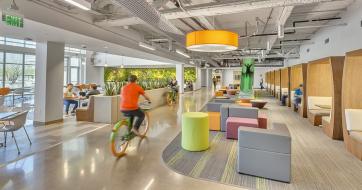
When on a search for office space, do millennials look for the same thing as everyone else or are they pushing work environments to change the trends for all of us?
A millennial is anyone born between 1982 and 2000. When people read those dates, they are always shocked. There’s usually someone who says “I didn’t realize I was a millennial.”
Millennials account for 25% of the American population. They are the largest generation in the workforce, bigger than the Baby Boomers by almost 10 million. Even though millennials are one of the most ethnically and culturally diverse generations, they’ll be pushing some broad trends into their work environments.
It’s no surprise that companies go out of their way to seduce talented people. If you’re smart, you’ll find out what your ideal employee wants and build an office environment that suits them.
That’s a critical strategy for hiring millennial employees, who change jobs every one to four years. According to State Street Global Advisors, 44% of millennials plan to leave their current position in the next two years, which means keeping them around is harder than previous generations.
You don’t need orange slides that wind between floors or treehouse offices to attract and retain millennials, but you should make these concessions.
[content_upgrade cu_id=”227″]Before you hire millennials, make sure you understand these common myths.[content_upgrade_button]Click Here[/content_upgrade_button][/content_upgrade]

A Bentley University study found that most millennials prefer a flexible work schedule. 77% say that open-ended work hours would make them more productive. They prioritize work/life balance over work itself, and want to be available for life experiences.
The same study found that 80% of millennials are willing to check work messages and contribute to company goals well after work hours. Interestingly, they integrate their job functions into their life, so that responding to a work email at a restaurant or taking a quick phone call on Sunday doesn’t feel like an interruption, so long as personal interruptions are permitted during work hours.
[Tweet “Millennials will let work interrupt their free time if their lives can interrupt work time.”]
How does this preference affect your office space? To court millennials, you should provide an accessible office. Give them access during nontraditional work hours, even if it means giving everyone a key. Let them use their own tools (laptops and phones) so work is always available. Most importantly, stop thinking of an empty chair as poor work ethic. Instead, measure results.
Millennials were born into technology. The oldest millennials have been using cell phones since they were in high school. The youngest had smart phones in elementary school. They work, socialize, and live their lives through technology.
Art Papas, CEO of Bullhorn, Inc., says it perfectly: “Millennials don’t look at technology as an extra. They expect to be able to use it in all aspects of their lives, including at home, in the community, and on the job.”
Millennials look for ways to make their jobs easier and faster. They want the flexibility that can only be achieved with modern technology. Don’t burden them with ancient computers. Be prepared to pay for that premium software tool. That said, many millennials are comfortable with “bring your own device” policies because it gives them freedom to work wherever and whenever they please (which could save you money).
Furthermore, give your younger, computer literate team members the freedom to implement and design their own tools. If you give them the tools you need, they will reward you with productivity.

Image source: K2 Space / Flickr
For years now, there has been a push for giant, open floor plans where everyone works in the same room. The idea is that millennials value communication and collaboration, so companies have literally attempted to break down barriers between employees. In fact, research shows that newer offices have been deliberately designed to represent the open spaces of college work/study environments. Fewer walls mean more talking, right?
Sure, but that’s not always a good thing. Open spaces create a pressure to look busy. When a CEO walks into the room, everyone wants to be at their desk, seemingly at work, even if collaboration (which is good work in the context of an open space) is better performed at the water cooler.
Furthermore, open offices are distracting. An employee’s productivity and creativity are squashed when everyone nearby can hear their conversations. This is especially important for salesmen or customer service representatives who spend a majority of their day on the phone.
Laura Munoz, saleswomen at Groupon, told Monster, “I loved feeling part of that community but as an inside sales rep I hated having people listen to all of my conversations. It was to an extent nice to pick up sales tips from listening to others, but it really made me act differently—either carefree or totally nervous. And of course, there was the occasional private conversation that you wish you didn’t hear.”
Nevertheless, open offices do create a sense of community that translates into job satisfaction. So how do you foster that community without damaging productivity? For small companies, the solution is to find out what your employees want and provide that layout.
Larger companies see success by offering a concept called “hoteling.” The idea is to provide different types of work environments to staff and let them work wherever they please. This means having an open workspace for collaboration and impromptu meetings, as well as quiet, reserved space for concentration. Technology being what it is means people can easily relocate workspace depending on their needs.

Happy employees are productive employees. (There’s really no need to back that up with science, but here it is anyway.) If you smooth out their frustrations, ease their fears, and solve their problems, you’ll create a workforce that gets more done and stays with your company for the long haul.
Some of the biggest companies have made tremendous investments into employee incentives, like personal concierge services, free catered food at all hours, free childcare, on-site gyms, and free laundry service. But those are likely out of your budget.
Still, you can easily improve your employee’s happiness and job satisfaction without giving them raises. Figure out what would make their lives easier that can be solved within your budget.
Does your team of five drink coffee throughout the day? Free coffee for a small team would only cost a few hundred dollars per year, but it would make your team grateful and productive. No late arrivals because the coffee line was long. No mid-day jaunts to the convenience store.
Does your staff like to educate themselves continually? You could reimburse a portion of their tuition or send them to industry conferences. Do they take fitness seriously? Pay for nearby gym memberships (you could probably get a group rate!).
Most importantly, a little perk for your employees makes your company known. You can be the business that lets employees bring their dogs to work, or the office with bagels every morning. Word will spread that will help you attract larger pools of job applicants.
[content_upgrade cu_id=”227″]Download our guide: Myths You Need to Stop Believing About Millennial Employees[content_upgrade_button]Click Here[/content_upgrade_button][/content_upgrade]
I’ve done a lot of generalizing in this article about a large group of people, but at the end of the day, you should create an office environment (and a business, for that matter) that makes your company the most successful.
Maybe your millennials need beer kegs, a ping pong table, and Spotify subscriptions. Maybe they want traditional cubicles and taupe-colored walls. The only way to find out what makes them productive is to ask. Use that data to create a work environment that maximizes your chance for success.
If you need assistance in your search for the ideal office space, we can help. Turnkey Office Space has many unique, modern and affordable spaces to choose from in cities throughout the country. Begin your free search now at TurnkeyOfficeSpace.com.


